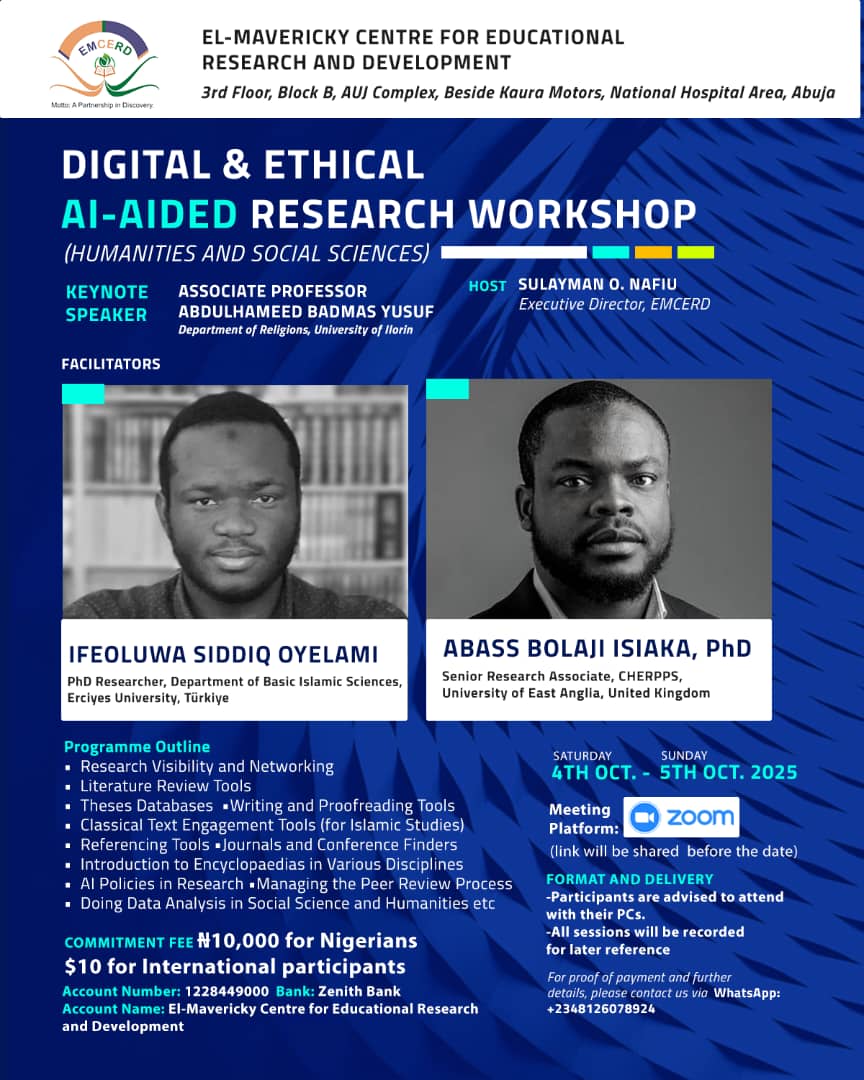In Nigeria, the Abuja-based El-Mavericky Centre for Educational Research and Development (EMCERD) is set to host its Digital & Ethical AI-Aided Research Workshop for scholars in the humanities and social sciences, marking it one of the significant steps in Nigeria’s effort to integrate artificial intelligence into academic research.
The two-day programme, scheduled for October 4–5, 2025, will feature renowned international academics and promises practical sessions on literature review, referencing, data analysis, and ethical AI policies.
Driving AI into Humanities Research
While much of the global AI conversation has centred on science, technology, and business, the Abuja-based think tank is turning attention toward the humanities and social sciences, fields often left behind in digital transformation.
The workshop will highlight tools for literature review, thesis development, proofreading, and referencing, alongside conference and journal finders that can significantly cut down research time.
Participants will also gain exposure to AI-assisted classical text engagement tools, particularly valuable for Islamic Studies scholars, and strategies for peer review management, a process often criticized for being slow and opaque.
Global Expertise at the Table
The event boasts a high-profile lineup of facilitators. Associate Professor Abduhameed Badmas Yusuf of the University of Ilorin will deliver the keynote address, setting the tone for discussions on the ethical integration of AI in research.
Sessions will be facilitated by Ifeoluwa Siddiq Oyelami, a PhD researcher at Türkiye’s Erciyes University, and Dr. Abass Bolaji Isiaka, a Senior Research Associate at the University of East Anglia in the United Kingdom. Both bring global perspectives on how AI is reshaping academic practice across borders.
The Numbers Behind the Workshop
Data underscores why such initiatives matter. According to UNESCO’s 2024 Global AI and Education Report, less than 18% of humanities and social science researchers worldwide currently use AI tools effectively in their research workflow, compared to nearly 57% in STEM fields.
In Nigeria, the figure is estimated to be under 10%, highlighting a significant digital divide.
The workshop aims to bridge this gap by providing hands-on training to scholars, particularly early-career researchers, who often lack access to cutting-edge digital tools.
EMCERD says the sessions will also confront ethical dilemmas surrounding plagiarism, algorithmic bias, and data privacy, issues that are shaping global debates on AI regulation.
Commitment and Access
The two-day programme will be conducted virtually via Zoom, ensuring broad accessibility for both Nigerian and international participants, (link to the meeting to be shared days before the due date).
EMCERD has set the commitment fee at ₦10,000 for Nigerian scholars and $10 for international participants, a symbolic fee aimed at encouraging inclusivity while sustaining operations.
EMCERD adds that all sessions will be recorded for future reference, ensuring participants can revisit the material later.
Participants are required to attend with their PCs to maximize the practical, hands-on component of the training.
A Broader National Mission
Founded in Abuja, EMCERD has positioned itself as a policy and research think tank bridging academia, governance, and society. It previously organized a town hall meeting on Nigeria’s Tax Bill and a convention on the post-subsidy era, sparking dialogue on pressing economic reforms.
By extending its reach into digital and ethical AI research training, the organization signals a commitment not just to policy debates, but also to equipping Nigerian academics with tools to compete globally.
Experts note that, workshops like this are vital for Nigeria to close the digital gaps in academia. Bringing AI into the humanities and social sciences ensures that our cultural, ethical, and historical inquiries keep pace with technological change.
Registration and Contact
Interested participants can register by making payment to El-Mavericky Centre for Educational Research and Development, Zenith Bank, Account Number 1228449000. Proof of payment and further details are available via WhatsApp at +2348126078924.
Talking Points
The upcoming Digital & Ethical AI-Aided Research Workshop by EMCERD is a timely and transformative intervention for the humanities and social sciences, two academic fields that have long been underserved in the global wave of artificial intelligence integration.
While STEM disciplines have rapidly adopted AI for data-driven innovation, the humanities and social sciences have lagged, often constrained by limited access to tools, training, and ethical frameworks.
This workshop has the potential to change that trajectory, not just in Nigeria but across the wider academic community, by democratizing access to AI-powered research methods, equipping scholars with practical skills, and sparking critical reflection on ethical challenges.
If effectively executed, it could serve as a model for how think tanks in the Global South can bridge the digital divide, ensuring that cultural, ethical, and historical inquiries are not left behind in the AI revolution but instead are enriched by it, contributing to a more balanced and inclusive global knowledge economy.





